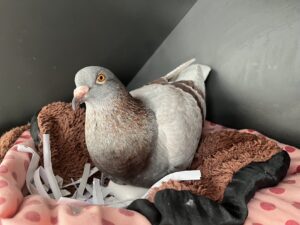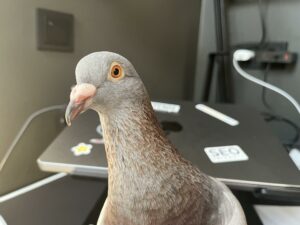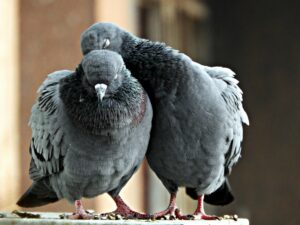When it comes to feeding pigeons, it’s not uncommon to have questions about their diet. One query that frequently arises is: “Do pigeons eat meat?”
It’s a fair question considering their often scavenging behavior in urban environments, and the answer can significantly impact how we feed them, particularly in a domestic setting.
Understanding the dietary needs and natural eating habits of pigeons is crucial, whether you’re a pigeon enthusiast, a birdwatcher, or a pigeon pet owner.
Providing an appropriate diet is not only vital for their health but also affects their behavior, longevity, and overall well-being.
Let’s dive into the fascinating topic of the pigeon diet and address the intriguing question: Do pigeons eat meat?
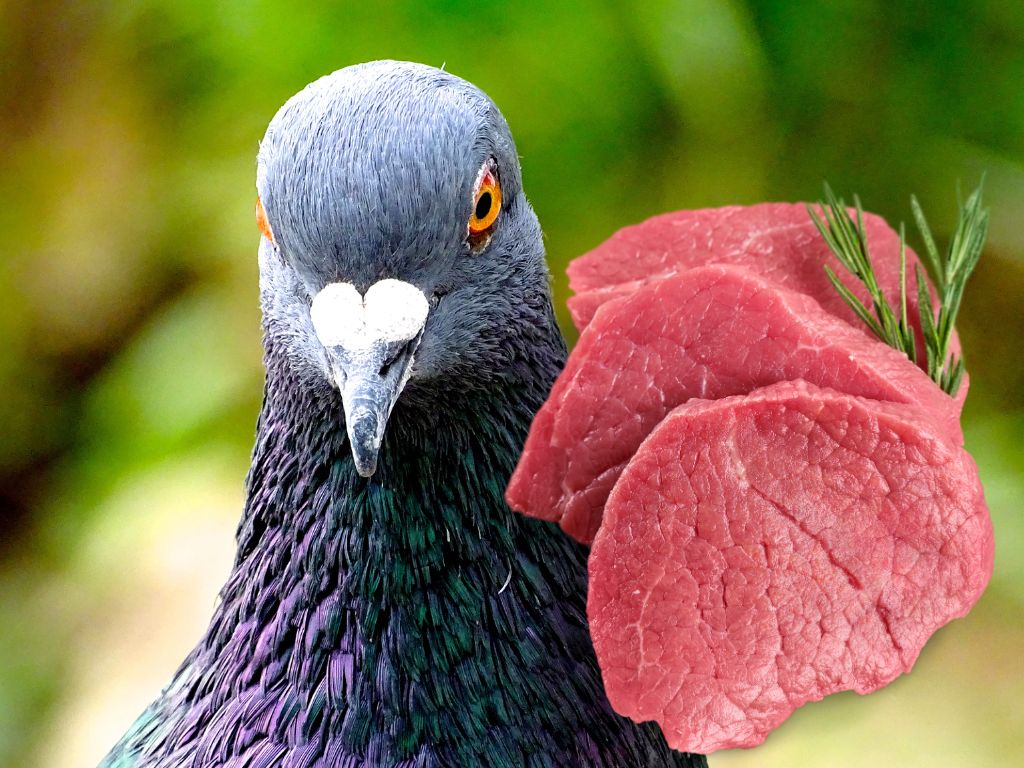
Do pigeons Eat Meat? Table of contents
Do pigeons eat meat? TL;DR
Pigeons, both wild and pet, do not naturally consume meat as part of their diet. They are primarily granivorous, feeding mainly on seeds and grains, with occasional fruits, vegetables, and small invertebrates.
While they may consume meat scraps in urban environments due to scavenging behavior, this is not a natural or healthy part of their diet.
Feeding meat to pet pigeons can lead to health problems, including digestive issues and nutritional imbalance. Veterinarians and avian experts strongly advise against feeding meat to pigeons.
Pigeon’s natural diet in the wild
Pigeons, particularly the ones you’re likely to see in urban environments (rock doves or city pigeons), have a dietary preference for seeds and grains.
- They’re essentially granivorous, meaning their primary food source consists of seeds, grains, and legumes.
- In their natural habitats, which can range from cliffs to cityscapes, pigeons spend a significant part of their day foraging for food.
- Their diet is usually diverse, involving a wide variety of seeds and grains. Pigeons consume everything from sunflower seeds, millet, corn, to various kinds of cereal grains.
- This preference for seeds and grains is biologically driven, as their digestive system is perfectly adapted to break down plant material.
However, pigeons are opportunistic feeders and have adapted remarkably well to urban environments, where they also consume fruits, berries, and vegetables.
In cities, they are often seen pecking at breadcrumbs, popcorn, or other food scraps left by people. Yet, it’s important to note that such human-provided foods don’t necessarily meet their nutritional needs and are not a part of their natural diet.
Check these articles:
The Dietary Needs of Pigeons
Just like any other living creature, pigeons require a balanced diet that caters to their nutritional needs. Here’s a closer look at their dietary necessities:
- Proteins: Although grains and seeds provide some protein, pigeons, especially young ones and breeding adults, require a good protein source for optimal health. Legumes can often provide this necessary protein.
- Vitamins: Pigeons need a variety of vitamins, particularly vitamin A, which they can get from green vegetables. Other essential vitamins include vitamin D, which is vital for calcium absorption and can be obtained from sunlight, and vitamin E for reproductive health.
- Minerals: Essential minerals include calcium and phosphorus for bone health, which can be derived from a diet including crushed oyster shells or grit.
- Carbohydrates and Fats: The primary source of energy for pigeons comes from carbohydrates found in seeds and grains. Fats, in moderation, are also necessary for providing energy, maintaining healthy skin and feathers, and aiding in the absorption of certain vitamins.
The importance of a balanced diet for pigeons cannot be overstated. An improper diet can lead to malnutrition, health issues, and shorter lifespan.
Similarly, a diet lacking in variety can lead to deficiencies in essential nutrients. It’s crucial to understand that while pigeons can eat a wide range of foods, not everything they eat contributes to a balanced diet.
Providing a diet that mimics what pigeons would eat in the wild, with the necessary additions of vitamins and minerals, ensures their optimal health and longevity.
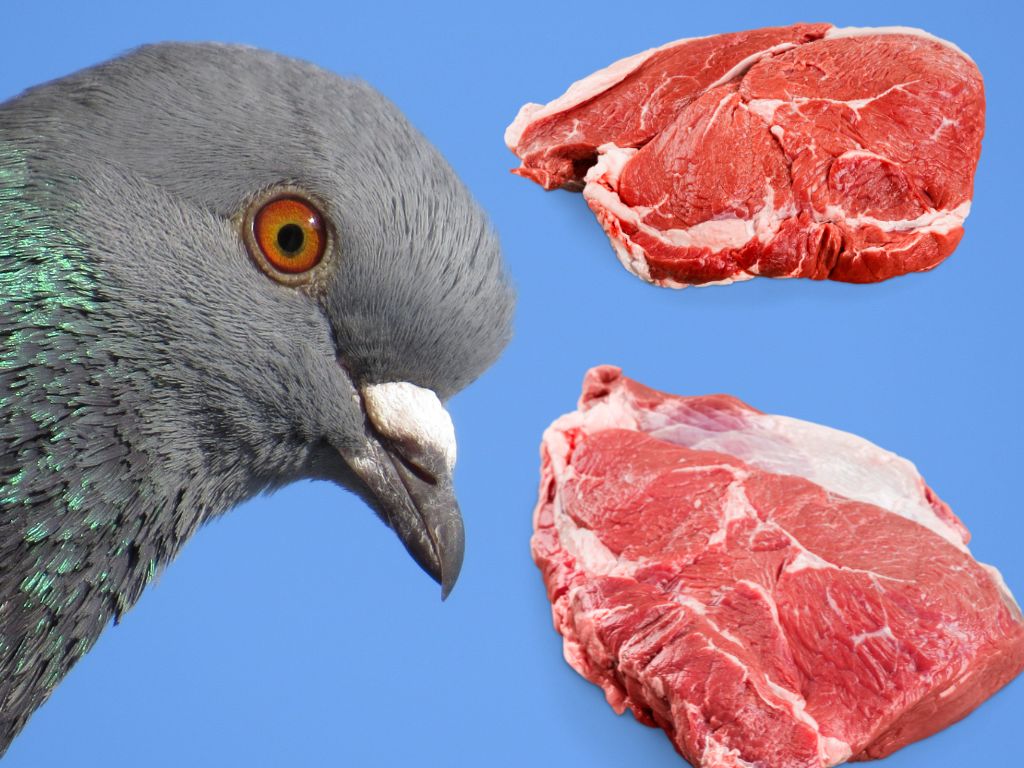
Do pigeons eat meat in the wild?
Pigeons are a common sight in many urban and rural environments, but few people may stop to consider what these adaptable birds eat. Their diet in the wild, which primarily consists of seeds, grains, and fruits, is influenced by their natural environment and the availability of food sources. However, there might be instances when they consume meat.
Analysis of pigeon’s natural eating habits
- Predominantly Granivorous: Pigeons, belonging to the Columbidae family, are largely granivorous. This means that their diet primarily consists of grains and seeds. They have a strong preference for seeds from cereal plants such as wheat, barley, and maize. Their stomachs are adapted to digest these hard substances, breaking them down with a combination of muscular action and strong digestive enzymes.
- Consumption of Fruits and Vegetables: In addition to grains, pigeons also consume fruits and vegetables available in their environment. Berries, apples, cherries, and various types of greens may constitute a part of their diet.
- Supplementing with Invertebrates: While pigeons are primarily seed-eaters, they occasionally supplement their diet with small invertebrates, such as insects, slugs, and snails. This is particularly common during the breeding season, when the demand for protein is high to support the growth of their young.
Check other articles about pigeon’s diet:
Instances and reasons if they consume meat
- Scavenging and Opportunistic Feeding: Pigeons are opportunistic feeders, which means they are capable of adapting their diet based on the availability of food sources. In urban environments, where natural food sources may be scarce, pigeons may scavenge on scraps left by humans. This can sometimes include small amounts of cooked meat, although it’s not a preferred or natural part of their diet.
- Nutritional Necessity: On very rare occasions, if the bird is extremely malnourished, they might eat meat out of sheer necessity to meet their nutritional needs. This is, however, not the norm and is more of an exception than a rule.
- Artificial Feeding by Humans: Another instance of pigeons eating meat occurs when they are artificially fed by humans. Some people may unknowingly or negligently feed pigeons meat products. However, this can be harmful to the pigeons as their digestive systems are not designed to process such food.
In conclusion, while pigeons may occasionally consume meat, particularly in urban environments where food scraps are readily available, they are naturally adapted to a diet of seeds, grains, fruits, and some small invertebrates. Their intake of meat in the wild is unusual and is not an integral part of their natural dietary behavior.
Should pet pigeons be fed meat?
Pigeons, despite their ability to adapt to a wide range of environments, have specific dietary needs.
For pet pigeons, their diet should mimic that of their wild counterparts as closely as possible.
Considering this, the question arises whether meat should be included in the diet of a pet pigeon. Let’s delve into this topic more comprehensively.
Potential effects of feeding meat to pigeons
- Digestive Issues: As mentioned earlier, pigeons are primarily granivorous, which means their digestive systems are well-equipped to break down grains and seeds, not meat. Feeding pet pigeons meat can lead to digestive issues, as their bodies aren’t designed to process this type of food. These problems may manifest in various forms such as diarrhea, constipation, or general digestive discomfort.
- Nutritional Imbalance: Feeding meat to pigeons can lead to a nutritional imbalance. Pigeons require a specific mix of nutrients, primarily obtained from grains, seeds, and some fruits, for optimal health. A diet heavy in meat could lead to an overabundance of certain nutrients and a deficiency in others, causing a range of health issues.
- Potential for Disease Transmission: Meat, particularly raw or improperly cooked meat, can carry pathogens that may be harmful or even fatal to pigeons. Bacterial infections, such as salmonella, are a particular concern. Even though cooking can kill many of these pathogens, it is not a risk worth taking given that meat is not a natural part of a pigeon’s diet.
Check this one: Do Pigeons Explode When They Eat Rice?
Expert opinions on this topic
- Avoidance of Meat in Diet: Veterinarians and avian experts strongly advise against feeding meat to pigeons. They stress the importance of a balanced diet that closely mimics what pigeons would eat in the wild – primarily grains and seeds, supplemented with fruits and occasional small invertebrates.
- Focus on Proper Nutrition: Instead of meat, experts recommend a diet based on pigeon pellets, which are specially formulated to provide the right balance of nutrients. Fresh fruits and vegetables can be given as a supplement. They also advise providing grit, a mixture of small rocks and minerals, which helps pigeons digest their food.
- Careful Monitoring of Dietary Intake: Experts also emphasize the need to monitor a pet pigeon’s diet closely. Any changes in eating habits or signs of digestive discomfort should be a prompt for veterinary attention. Regular health check-ups are also recommended to ensure the pigeon’s overall well-being.
In summary, pet pigeons should not be fed meat. It is essential to provide a diet suitable for their species-specific needs, focusing on grains, seeds, pigeon-friendly fruits, and vegetables. Regular veterinary care and dietary monitoring will ensure that your pet pigeon remains healthy and thrives.
The Dangers of an Improper Diet for Pigeons
Feeding pigeons an improper diet can lead to a host of health problems. This includes malnutrition, obesity, and diseases like Avian Gastric Yeast (a yeast infection in the digestive tract), all due to nutrient deficiencies or overconsumption of harmful foods.
Common health issues related to improper pigeon diets include:
- Obesity: Overconsumption of high-fat foods or overfeeding can lead to obesity in pigeons, affecting their mobility and leading to a variety of health complications.
- Malnutrition: A diet that lacks necessary nutrients can lead to malnutrition, making pigeons more susceptible to diseases and infections.
- Digestive problems: Feeding pigeons food they can’t properly digest, like large amounts of bread or meat, can lead to digestive issues.
It’s important to avoid feeding pigeons harmful foods such as chocolate, caffeine, alcohol, salty and sugary foods, or any food containing toxic substances like pesticides. These can cause serious health problems and even be fatal to the birds.
Final thoughts on pigeons eating meat
In conclusion, while pigeons are adaptable and opportunistic feeders, their natural diet mainly consists of seeds and grains, supplemented by fruits, vegetables, and legumes. Their diet in the wild rarely, if ever, includes meat. Providing a proper, balanced diet is essential for their health and wellbeing.
Understanding a pigeon’s dietary needs is crucial, whether you’re feeding them in your backyard or caring for them as pets. The aim should always be to mirror their natural dietary patterns as closely as possible and to avoid harmful foods. By doing so, we can support these fascinating birds’ health and longevity, enabling them to continue their integral role in our urban ecosystems.
Can pigeons eat meat? FAQs
Here the the most often-asked questions about pigeons eating meat.
Do pigeons eat meat in the wild?
No, pigeons in the wild predominantly eat seeds, grains, and sometimes fruits and vegetables. They are not naturally inclined to consume meat.
Can I feed my pet pigeon meat?
It’s not recommended to feed your pet pigeon meat. Their digestive system is designed to process seeds and grains, and they might have difficulty digesting meat.
What happens if a pigeon eats meat?
While pigeons might be able to consume small amounts of meat, their digestive system isn’t equipped to handle it regularly or in large amounts. This could lead to digestive issues or nutrient imbalances.
Do pigeons need protein in their diet?
Yes, pigeons require protein in their diet. However, they typically get it from plant-based sources, like legumes, and specially designed pigeon feeds.
What should I feed my pigeon instead of meat?
A healthy pigeon diet should consist of specially formulated pigeon feed, which includes a mix of grains, seeds, and legumes. Fresh fruits and vegetables can also be offered for extra nutrients.
I found a pigeon eating meat scraps. Is this normal?
Pigeons are opportunistic feeders, and in urban environments, they might peck at meat scraps. However, this is not a part of their natural diet and doesn’t provide them with the nutrients they need.
Does meat harm pigeons?
Regularly consuming meat can be harmful to pigeons, potentially leading to digestive problems and nutritional imbalances.
Can pigeons eat insects?
While pigeons might occasionally consume insects, they are primarily granivorous, meaning they prefer grains and seeds. Insects do not form a significant part of their diet.

